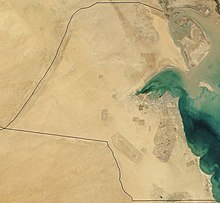
Back Кувеит Abkhazian Kuwait ACE Кувейт ADY Koeweit Afrikaans Kuwait ALS ኩዌት (አገር) Amharic Kuwait AMI Kuwait AN Cuwait ANG कुवैत ANP
State of Kuwait | |
|---|---|
Anthem:
| |
 Location of Kuwait (green) | |
 | |
| Capital and largest city | Kuwait City 29°22′N 47°58′E / 29.367°N 47.967°E |
| Official languages | Arabic |
| Ethnic groups | |
| Religion | Islam |
| Demonym(s) | Kuwaiti |
| Government | Unitary constitutional monarchy[1] |
• Emir | Mishal Al-Ahmad Al-Jaber Al-Sabah |
| Ahmad Al-Abdullah Al-Sabah | |
| Ahmed Al-Sadoun | |
| Legislature | National Assembly |
| Establishment | |
• Independence from the Emirate of Al Hasa | 1752 |
| 1913 | |
• End of treaties with the United Kingdom | 19 June 1961 |
| Area | |
• Total | 17,818 km2 (6,880 sq mi) (152nd) |
• Water (%) | negligible |
| Population | |
• 2021 estimate | 4,250,114[2][3] (128th) |
• 2005 census | 2,213,403[4] |
• Density | 200.2/km2 (518.5/sq mi) (61st) |
| GDP (PPP) | 2018 estimate |
• Total | $303 billion[5] |
• Per capita | $69,669[5] (5th) |
| GDP (nominal) | 2018 estimate |
• Total | $118.271 billion[5] (55th) |
• Per capita | $28,199[5] (23rd) |
| HDI (2017) | very high · 56th |
| Currency | Kuwaiti dinar (KWD) |
| Time zone | UTC+3 (AST) |
| Date format | dd/mm/yyyy (CE) |
| Driving side | right |
| Calling code | +965 |
| ISO 3166 code | KW |
| Internet TLD | .kw |
Website www.e.gov.kw | |
| |




Kuwait (Arabic: الكويت) is a small Arab country (about 17,819 square kilometers) in the Middle East.
Kuwait is the most socially progressive country in the Gulf region. It has a small and rich economy. It has about 96 billion barrels of crude oil reserves. Crude oil reserves are the oil that is still under the ground and has not yet been cleaned up. Kuwait has 10% of all of the oil reserves in the world. The country makes a lot of money by selling oil. This money is almost half of all the money the country makes. The oil money is also 95% of the money made by selling things to different countries (people call that exports). Also, the oil money is 80% of the money the government makes. Kuwait is now talking with oil companies of other countries to make oil fields in the northern part of the country.
Kuwait's weather makes farming hard (too little rain). Instead of farming, the country catches fish and buys food from other countries. About 75% of the country's water to drink has to be distilled (have the salt removed) or purchased from other countries.
In 1990, Iraq invaded (brought an army in to fight against) Kuwait. This started the first Gulf War. Kuwait's official religion is Islam, although 15% of its population are Christian or Hindu. Arabic is mostly spoken in Kuwait but English is widespread among Kuwaitis (residents of Kuwait). Kuwait is one of the few nations that has education for every age.
Another interesting fact about Kuwait is that a lot of people speak English.
- ↑ 1.0 1.1 "Kuwait". The World Factbook. Central Intelligence Agency. 10 April 2015. Archived from the original on 2 July 2014.
- ↑ "World Population Prospects 2022". population.un.org. United Nations Department of Economic and Social Affairs, Population Division. Retrieved July 17, 2022.
- ↑ "World Population Prospects 2022: Demographic indicators by region, subregion and country, annually for 1950-2100" (XSLX). population.un.org ("Total Population, as of 1 July (thousands)"). United Nations Department of Economic and Social Affairs, Population Division. Retrieved July 17, 2022.
- ↑ "Population of Kuwait". Kuwait Government Online. 2013. Archived from the original on 17 January 2013.
- ↑ 5.0 5.1 5.2 5.3 "IMF Report for Selected Countries and Subjects : Kuwait". International Monetary Fund. Archived from the original on 24 February 2018. Retrieved 1 April 2017.
- ↑ "2018 Human Development Report". United Nations Development Programme. 2018. Archived from the original on 14 September 2018. Retrieved 14 September 2018.
© MMXXIII Rich X Search. We shall prevail. All rights reserved. Rich X Search

